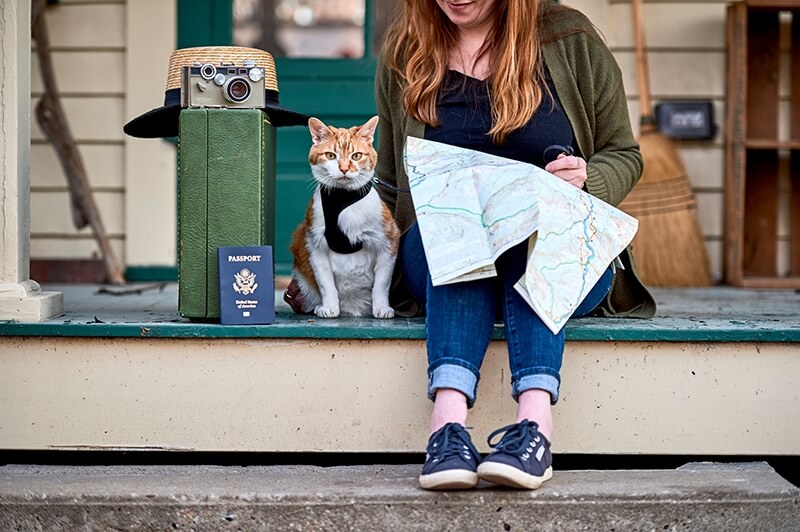Traveling with pets can be a wonderful experience, but it also requires some preparation to ensure that your furry friend stays healthy and safe during the journey. One important document that you may need to consider is a pet health passport. In this article, we will provide a comprehensive guide to pet health passports, including what they are, why they are important, and how to obtain one.
Also, we will cover the following topics:
- What is a Pet Health Passport?
- Why Do You Need a Pet Health Passport?
- How to Get a Pet Health Passport
- Traveling with a Pet Health Passport
What is a Pet Health Passport?
As a responsible pet owner, it’s essential to ensure your furry friend’s health and safety during travel. One crucial document that pet owners should consider obtaining is a pet health passport.
Definition and Purpose of a Pet Health Passport
 A pet health passport certificate is a document that contains important information about your pet’s health, vaccinations, and medical history. It serves as proof that your pet meets the health requirements for travel and can be presented to authorities upon arrival at your destination.
A pet health passport certificate is a document that contains important information about your pet’s health, vaccinations, and medical history. It serves as proof that your pet meets the health requirements for travel and can be presented to authorities upon arrival at your destination.
Types of Information Included in a Pet Health Passport
The information included in a pet health passport varies depending on the country’s requirements. However, common information includes your pet’s identification details, such as microchip numbers and physical descriptions, a record of all vaccinations and their validity dates, and a recent record of your pet’s health status. Pet passport & medical record are the most important.
Differences Between Pet Health Passports and Regular Pet Travel Documents
A lot of people wonder about pet passport vs health certificate and the difference between pet passport and health certificate. It’s essential to note that a dog health passport, or pets in general, is different from a regular pet travel document, such as a health certificate. Animal health certificate or pet passport is only valid for a specific period and is required for travel within the same country or state. In contrast, a pet health passport is usually valid for the pet’s entire life and can be used for international travel.
Why Do You Need a Pet Health Passport?
If you’re planning to travel with your pet internationally, you may be required to obtain a pet health passport or an animal health certificate. But why do you need one?
Legal Requirements for Traveling with Pets
First and foremost, many countries have strict legal requirements when it comes to traveling with pets. A pet health passport or animal health certificate EU passport is often required to prove that your pet has had certain vaccinations, treatments, and tests. Without these documents, your pet may not be allowed to enter the country, or they may be subject to quarantine upon arrival.
Benefits of having a Pet Health Passport
 Aside from legal requirements, having a pet health passport can also provide peace of mind and several benefits. It serves as a complete record of your pet’s medical history, including vaccinations, treatments, and tests. This can be especially helpful in case of an emergency while traveling, as it can quickly provide vital information to local veterinarians. A pet health passport can simplify the travel process by consolidating all necessary information in one place. This can save time and reduce the likelihood of missing important information or documentation.
Aside from legal requirements, having a pet health passport can also provide peace of mind and several benefits. It serves as a complete record of your pet’s medical history, including vaccinations, treatments, and tests. This can be especially helpful in case of an emergency while traveling, as it can quickly provide vital information to local veterinarians. A pet health passport can simplify the travel process by consolidating all necessary information in one place. This can save time and reduce the likelihood of missing important information or documentation.
Risks of not having a Pet Health Passport
On the other hand, not having a pet health passport can come with significant risks. Your pet may be denied entry into the country, or they may be subject to long periods of quarantine. This can be both stressful and costly for both you and your pet.
How to Get a Pet Health Passport
Do I need an animal health certificate if I have an EU pet passport? If you’re planning on traveling internationally with your pet, you’ll need to obtain a pet health passport. Here’s how to get one:
Requirements for Obtaining a Pet Health Passport
The requirements for obtaining a pet health passport vary depending on the country you’re traveling to and from. However, in general, you’ll need to make sure that your pet is up to date on their vaccinations and has a microchip implanted for identification purposes.
Other requirements while traveling to Europe might include new ETIAS visa. European Travel Information and Authorization System (ETIAS) is a new security measure of the EU, set to come into force from Spring 2025. The system will serve as an additional security layer and ETIAS will be mandatory for the visa-exempt third country nationals for those travelers, who didn’t need any permit to travel to the Schengen Area before. As of today, nationals of 58 countries in the world, including Mexican Citizens, will be eligible for ETIAS authorization.
Process for Obtaining a Pet Health Passport
 To obtain a pet health passport, you’ll need to visit your veterinarian. Your veterinarian will examine your pet and make sure they meet the requirements for travel. Well, they will then issue you a pet health passport, which will include your pet’s microchip information, vaccination history, and other relevant health information.
To obtain a pet health passport, you’ll need to visit your veterinarian. Your veterinarian will examine your pet and make sure they meet the requirements for travel. Well, they will then issue you a pet health passport, which will include your pet’s microchip information, vaccination history, and other relevant health information.
Costs Associated with Obtaining a Pet Health Passport
The costs associated with obtaining a pet health passport can vary depending on your veterinarian’s fees and the requirements for travel. Definitely, you should expect to pay for the cost of the examination, any required vaccinations, and the cost of the pet health passport itself.
Recommended Time Frame for Obtaining a Pet Health Passport Before Travel
It’s recommended that you start the process of obtaining a pet health passport at least several weeks before your planned travel date. This will give your veterinarian enough time to complete the necessary examinations and vaccinations and issue you the pet health passport.
As mentioned above, ETIAS is going to be a huge factor for people wishing to travel to Europe in 2025. ETIAS will be eligible only for those country nationals, who enjoy visa-free travel with the European Union. As of today, the list includes 58 countries, including Mexico. You can see ETIAS travel information on this website. Once you get your authorization you will be able to travel with ETIAS for three years and stay in the EU/Schengen Area for up to 90 days within 190-day period.
Traveling with a Pet
Traveling with a pet can be a wonderful experience, but it’s important to make sure you have all the necessary documents and information to ensure a safe and comfortable trip for both you and your furry friend. Here are some guidelines for traveling with a pet health passport:
- Always carry your pet health passport with you when traveling with your pet. This is essential for proving your pet’s vaccination status, as well as other important medical information.
 Make sure your pet is up-to-date on all necessary vaccinations and treatments before traveling. This really can help prevent the spread of diseases and protect your pet’s health.
Make sure your pet is up-to-date on all necessary vaccinations and treatments before traveling. This really can help prevent the spread of diseases and protect your pet’s health.- Consider your pet’s comfort during travel. This may include providing a comfortable carrier or crate, bringing along familiar toys or blankets, and making sure your pet has plenty of water and access to a litter box.
- If your pet becomes sick or injured while traveling, seek medical attention immediately. Well, You may need to visit a local veterinarian or, also the animal hospital, depending on the severity of the situation.
Final Thoughts
In conclusion, a pet health passport is an essential document for traveling with your pet. It includes important information about your pet’s health and vaccination status, and it can help avoid any potential health risks during travel. Obtaining a pet health passport is a straightforward process, and it’s recommended to obtain it well in advance of travel.
With a pet health passport, you can travel with your furry friend with confidence, knowing that they have the necessary documentation to ensure a safe and comfortable trip. Don’t forget also to follow guidelines for traveling with a pet and keep your pet safe and comfortable during travel. So, if you’re planning to travel with your pet, don’t hesitate to get a pet health passport and make sure you have a happy and healthy trip together.
